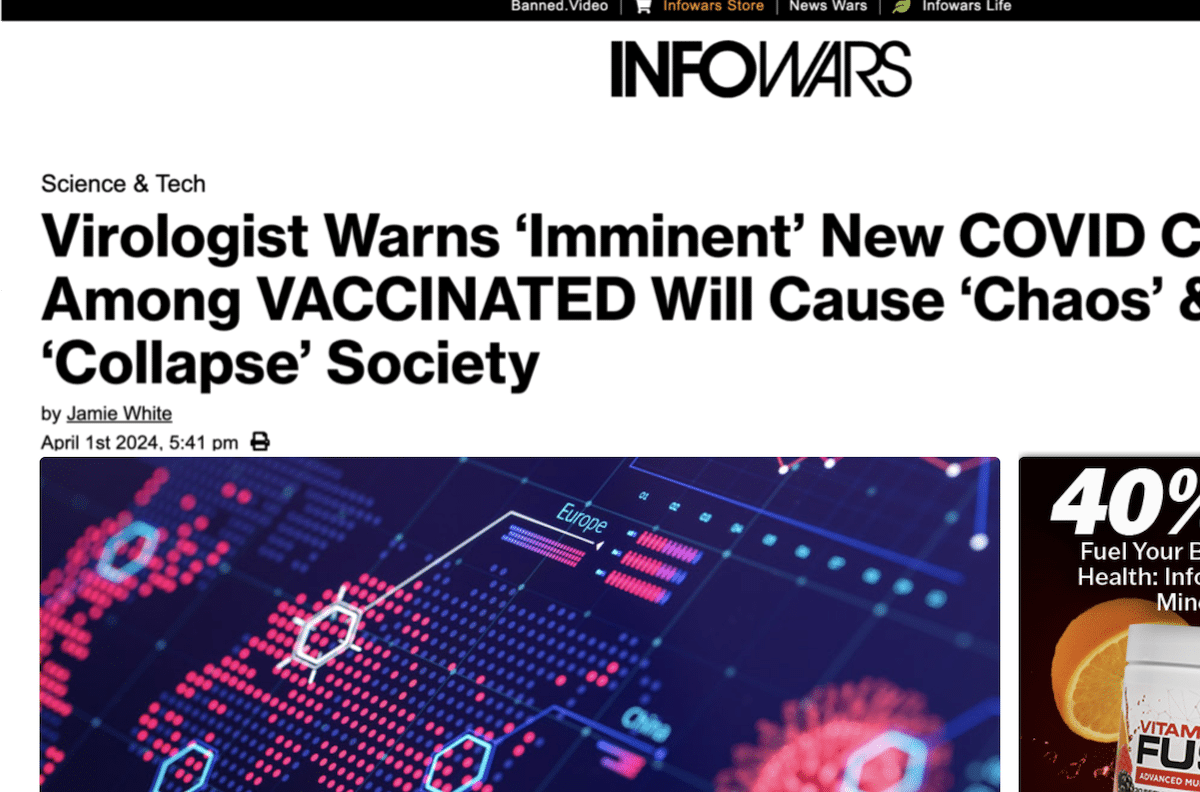- Health
COVID-19 vaccines are effective at preventing illness and death; rare infections in vaccinated people can still occur, as seen in the Celebrity Millennium cruise
Key takeaway
Clinical trials and ongoing monitoring of COVID-19 vaccination campaigns showed that people vaccinated against COVID-19 are less likely to get infected. Given that no vaccine effectiveness is 100% effective, some vaccinated people are expected to get infected nonetheless. Vaccines are still useful even for infected persons as they prevent serious illness and hospitalization.
Reviewed content

Verdict:
Claim:
“Passengers on first fully vaccinated [...] cruise ship test positive for COVID-19. Almost like the shot is useless.”
Verdict detail
Misleading: No vaccine is 100% effective, but this isn’t an essential requirement for a vaccine to be effective at reducing the impact of a disease, contrary to what is claimed in the post, as long as they significantly reduce the number of infections or the severity of disease.
Flawed reasoning: In order to determine a vaccine’s effectiveness at reducing the number of infections, one would need to compare a ship with vaccinated people to an identical ship full of unvaccinated people as a control, which wasn’t done here.
Full Claim
“Passengers on first fully vaccinated [...] cruise ship test positive for COVID-19. Almost like the shot is useless.”
Review
On 26 May 2021, the U.S. Centers for Disease Control and Prevention (CDC) lifted the requirement for mask-wearing and physical distancing on cruise ships where at least 95% of the crew and 95% of the passengers were vaccinated against COVID-19. Cruise ships had been under a “no sail order” from the CDC since 14 March 2020 owing to their role in forming COVID-19 clusters and propagating the disease worldwide.
While several COVID-19 outbreaks were associated with cruise ships in the early days of the pandemic, the progress in vaccination made it possible to envision safer trips with vaccinated people onboard. The lifting of these sailing restrictions play a role in alleviating business sectors, like the cruise industry, that have been severely affected by the COVID-19 pandemic.
On 5 June 2021, the Celebrity Millennium set sail from Philipsburg, St. Maarten, becoming the first major cruise ship to leave a North American port since the onset of the pandemic, with 600 passengers and 650 crew members on board. According to the cruise company, all passengers and crew members were vaccinated against COVID-19. However, two passengers tested positive for COVID-19 by the end of the 7-day cruise.
This news circulated on social media platforms, and some framed this incident in a way that suggested that COVID-19 vaccines are not efficient enough, as shown in the caption of this Instagram post stating “almost like the shot is useless”. However, such a presentation is misleading and is an example of the nirvana fallacy. The fact that a few people still get infected by SARS-CoV-2 in spite of vaccination doesn’t mean that COVID-19 vaccines as a whole are useless.
Clinical trials and ongoing monitoring show that vaccinated people are much less at risk of developing COVID-19 and severe disease than unvaccinated people. Large clinical trials involving tens of thousands of volunteers showed that the Pfizer-BioNTech, Moderna, and Johnson & Johnson COVID-19 vaccines reduced the risk of symptomatic COVID-19 in the vaccinated group by 95%, 94.5% and 66.9%, respectively, compared to the group that didn’t receive the COVID-19 vaccine.
According to the CDC, these vaccines reduce the number of COVID-19 patients needing hospitalization by at least 89%. Summarizing the available evidence, the CDC reported that the vaccines are approximately 90% effective against SARS-CoV-2 infection, including asymptomatic cases.
As can be seen from the numbers above, COVID-19 vaccines are potent tools to prevent people from getting sick and the virus from circulating. In fact, the World Health Organization (WHO) stated that acceptable COVID-19 vaccines should have an efficacy in clinical trials of at least 50% and ideally 70%. Therefore, the COVID-19 vaccines used in the U.S. are well above the requirements from the WHO.
Because their effectiveness is less than 100%, some vaccinated people are expected to become infected. These infections are called breakthrough cases. The CDC registered a total of 10,262 breakthrough cases as of 30 April 2021 for 101 million fully vaccinated persons at that time. Therefore, the fact that two people tested positive doesn’t mean that COVID-19 vaccines don’t work. For example, vaccines against rotavirus, a virus which causes diarrhea in children, only prevent the serious form of the disease, yet allowed a 90% reduction in the number of rotavirus-associated hospitalizations.
Furthermore, the reasoning of that claim is flawed due to the lack of a control group. In order to draw conclusions of the effectiveness of COVID-19 vaccines, one would need to compare the number of cases on that ship full of vaccinated people with a similar ship full of unvaccinated people. Given that this comparison is not made, and, probably, is impossible to make, it is not possible to conclude of the effectiveness of COVID-19 vaccines based on the small number of cases on the Celebrity Millennium.
In summary, the small number of COVID-19 cases on the Celebrity Millennium cruise ship despite all the passengers and crew being vaccinated isn’t evidence that COVID-19 vaccines are useless. In fact, their effectiveness is well above the threshold set by the WHO.



